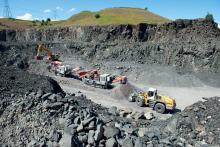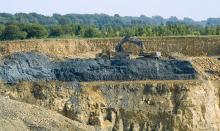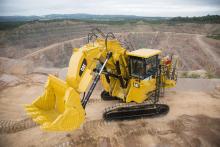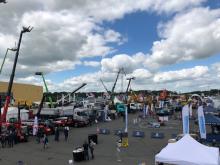Action is urgently needed in the UK to ensure supplies of over 5 billion tonnes of minerals for the next 25 years. Patrick Smith reports.
A major conference next month will again emphasise just how vital minerals and mineral products are to the UK economy.
Each year, Great Britain produces some 360 million tonnes of aggregates and manufactured mineral products, and the quarry industry supports the building of 180,000 homes; maintenance of 230,000 miles of roads (370,000km) and 10,000 mile (16,000km) rail networks; a £1 billion (€1.14 billion) hospital building programme, and a £1.6 billion (€1.8 billion) school and university improvement programme
However, there is growing concern that their supply, and the policies supporting the industry, are increasingly being neglected by government.
According to the UK
“Industry production represents the largest materials flow in the UK economy and is also one of the largest manufacturing sectors,” says the MPA, which is the trade association for the aggregates, asphalt, cement, concrete, dimension stone, lime, mortar and silica sand industries.
MPA membership is made up of a majority of small and medium-sized quarrying companies throughout the UK, as well as major international and global companies.
It covers 100% of UK cement production, 90% of GB aggregates production, 95% of asphalt and over 70% of ready-mixed concrete and precast concrete production.
Another organisation, the
It says there are still some 230 independent businesses that generate thousands of jobs all over the country.
The UK Minerals Strategy, which sets out an agenda for British industry, government and others to drive sustainable supply of minerals for the next generation, will be launched and published at the Living with Minerals 6 (LWM6) conference organised by the CBI Minerals Group and MPA on 10 July in London.
“Minerals and mineral products are essential to the economy and our quality of life,” say the organisers.
Entitled The Future of Minerals and the UK Minerals Strategy, the half-day event will include speakers and panel sessions drawn from the industry, regulators, planners, and non-governmental organisations (NGOs), who will consider recent investments and developments, including changes in national planning policy, and the challenges faced to ensure supply is maintained.
“Our sixth Living with Minerals event could not be more topical or urgent: minerals and mineral products are essential for the economy and their supply cannot be assumed: it needs planning, monitoring and managing,” says Nigel Jackson, chairman of the CBI Minerals Group and chief executive of the MPA.
“Government has taken its eye off the ball and is failing to make the link between the need for a secure supply of minerals and mineral products to enable the delivery of much-needed housing and infrastructure, and to underpin wider economic growth.
“The conference, and the UK Minerals Strategy that we will be launching, aim to galvanise the industry, planners, NGOs, other relevant stakeholders and government into action to ensure supplies of over 5 billion tonnes of minerals and mineral products are secured and properly planned and supplied for the next 25 years.”
Meanwhile, MPA says that following some improvement in demand towards the end of 2017, mineral products markets started the year slowly, hit by weak construction activity and the impact of the particularly cold weather.
Official statistics show construction output declined by 3.3% over Q1 2018, the biggest quarterly fall since mid-2012, and feedback from MPA members suggests that not only was work on site being stopped because of the weather itself, but also because of energy shortages.
“Further growth this year in terms of new housing and infrastructure construction work should support mineral products markets,” says Aurelie Delannoy, director of economic affairs at MPA.
"However, this will be offset by the sharp decline expected in commercial work, the third biggest construction sector. Should greater clarity emerge on the Brexit negotiations over the next few months be achieved, this would help unlock stalled investment decisions since the referendum, although it would still take time for new investment decisions to translate into new market demand. This means mineral products producers are expecting a generally flat market this year.
“Markets will have to wait for 2019, when a boost in demand should come from the planned acceleration in the Road Investment Strategy spending plans and work underway for HS2 [high-speed rail link] and Hinkley Point C [power station]. It is therefore essential that there are no further delays on the delivery of these projects, and that any new and unnecessary sources of economic and political uncertainty are averted, to boost confidence and encourage positive investment decisions.”
At the same time figures show that retail sales of construction and earthmoving equipment in the UK market grew by 5.7% in the first quarter of 2018, compared with the same period in 2017, according to the UK equipment statistics exchange, which was taken over in 2017 by Systematics International, a specialist data processing company. The scheme is run in partnership with the
This is said to be an encouraging out-turn, against the background of a weak construction market in the first quarter of the year.
But, while equipment sales remain on an upward trend on a quarterly basis, the levels of growth are showing a slowing momentum, with growth in the first quarter of last year, for example, exceeding 10%.
A factor continuing to boost demand in the early months of the year has been fleet replenishment within the rental industry. In the UK market, the rental industry is estimated to account for over 60% of equipment supply, and is more significant than in other European markets.
However, the latest survey by the European Rental Association, which was published in April, anticipates that growth in the UK rental market in 2018 will only be 0.5% for the full year, and will lag behind growth in other major European countries.
Meanwhile,
David Munns, sales director, says that Q1 2018 sales are very much in line with the company’s forecast and the same period in 2017, and demand is growing with the demand for equipment being strong and order intake at record levels.
Asked what is driving the demand for the equipment, particularly in the aggregates sector, he says that it is housebuilding, with demand for all products being high but for wheeled loaders in particular.
“SMT GB maintains very close relationships with key players in the market. We continue to develop solutions to the challenges faced by our customers in many different market segments,” says Munns.
“We are forecasting growth in volume for all products with an expectation of an overall +15% (compared to the prior year).”
Philip Battle, head of mining, extraction and paving, UK and Ireland,
“This builds from the uptick in demand that we saw in 2017. Some of the major infrastructure contracts are starting to be awarded and quarry and aggregates customers are becoming increasingly confident, despite some of the obvious macro-economic headwinds in the UK in particular.”
Demand is fairly evenly spread across all Caterpillar construction equipment product groups, with the quarry and aggregates sector looking to reinvest into their aged fleets, to either replace or rebuild machines, giving them a second life, and technology is also a major driver when it comes to future planning.
“As infrastructure work is awarded and with more projects kicking-off, we are likely to continue to have a positive year as the outlook becomes more certain and confidence returns,” says Battle.
“Over the last three years Finning has invested heavily in digital solutions, including traditional information technology platforms and more advanced new digital capabilities.”
Both companies will be joining other major international players and exhibiting at the upcoming
The event is a sell-out with a record 525 companies exhibiting, compared to 476 in 2016, making it 10% larger than ever before.
Another major move in the aggregates sector has seen
Lagan, a supplier of construction materials and contract surfacing in Ireland and the UK, is based in Belfast, Northern Ireland, and has a modern cement plant in Kinnegad, Republic of Ireland; nine active quarries; 13 asphalt plants, and nine ready-mixed concrete plants.
The combination of Breedon and Lagan will create a leading independent construction materials group in the UK and Ireland, and enables Breedon to enter the attractive Irish construction market and provides significant opportunities to expand upstream through the aggregates business in Ireland and downstream through the asphalt and ready-mixed concrete operations.








